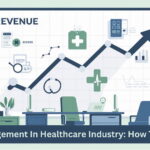According to a study, 55% of patients like telehealth visits more than physical consultations which shows how quickly patient engagement is changing. This change emphasizes the importance of healthcare providers looking for new ways to improve patient and community engagement.
On that note, public relations (PR) in the healthcare sector has the important function of connecting health service providers with their communities. As healthcare keeps changing with new technologies and patient hopes, healthcare PR strategies must also evolve to guarantee efficient communication, build trust, and foster good relationships between healthcare providers and patients.
In this blog post, we’ll discuss the very important role that PR plays in the healthcare sector. We’ll also explore strategies for engaging as well as look into future trends shaping this crucial area of communication within health services.
Understanding Patient and Community Engagement
Patient engagement is very important for enhancing results in healthcare. It means giving patients the ability to participate actively in processes related to their health, such as learning about it and being part of decision-making. When a patient engages with their healthcare provider, they are more likely to stick with treatment plans and take responsibility for maintaining good health which then leads to improved overall outcomes.
On the other hand, by working closely with local leaders of communities, organizations, and establishments, healthcare providers can discover and manage common health problems. This type of collaboration promotes a culture of health while also building trust in the people who offer medical help. It ensures that those providing healthcare are relevant and reachable for the community they serve.
Strategies for Effective PR in Healthcare
Creating a patient-focused communication plan is crucial to customizing healthcare messages for various patient demographics. Knowing the distinct requirements, likes, and responses of different groups of patients enables healthcare providers to transmit personalized health details efficiently. Such a method improves patient education and boosts their engagement and authority in making decisions about their health.
To have better community relationships, it is important to work together with people and groups in the community. This can be done by participating in health fairs, workshops, and other events happening within the area where you provide services. This shows your dedication to dealing with local health issues while also trying to enhance overall public health results through various activities that happen locally. When healthcare providers interact with their community in a significant manner, they can create trust relationships while promoting open conversation; this helps them improve their standing as the main provider of healthcare within the given region.
Using social media and digital platforms to spread health information is very important because they help in reaching more people. On these platforms, healthcare organizations can put up educational content, advertise campaigns for health awareness, and interact with patients and the community instantly.
Media Relations and Crisis Communication
For healthcare PR, it is very important to build good connections with the media. This helps in making sure that healthcare-related subjects are covered accurately and at the right times. In a crisis, clear and prompt communication with the media can aid healthcare organizations in handling the situation well by giving accurate details for public knowledge, thus maintaining trust. Managing media relations and dealing with crisis communication strategies beforehand will help professionals in healthcare PR reduce the effects of a bad reputation on their organization’s image.
Measuring the Impact of PR Efforts
To understand the effect of PR attempts, you need to keep a record of different measures like patient satisfaction ratings, rates at which social media users engage with posts, and also how well community events go. These measurements give a useful understanding of the success of PR plans and actions. By consistently assessing PR efforts, healthcare PR experts show that their activities are worthwhile and enhance communication methods for achieving organizational goals efficiently.
Challenges and Considerations
Healthcare PR faces several challenges, including maintaining patient confidentiality, navigating misinformation, and addressing public skepticism. Ethical considerations are crucial in this context, particularly when handling sensitive patient information and ensuring compliance with healthcare regulations. Addressing misinformation swiftly and effectively is crucial to maintaining public trust and credibility, emphasizing the importance of accurate and transparent communication in healthcare PR practices.
Future Trends in Healthcare PR
The future of healthcare PR will be shaped by advancements in digital health communication and emerging technologies. Predictive insights and custom-tailored communication strategies may be greatly enhanced by artificial intelligence and machine learning.
These advancements can increase patient engagement through personalized health information as well as enhance communication efficiency within healthcare environments. Additionally, there will probably be an ongoing focus on telehealth and remote monitoring. This means that new PR methods are needed to talk with patients better and adjust to changes in how healthcare is given.

Conclusion
For better healthcare results and trust-building, it is very important to engage patients and communities through good PR strategies. By concentrating on communication centered around patients, using digital platforms well, and maintaining good media relationships, healthcare providers can improve how they engage with people. Looking ahead to future trends and dealing with problems will make sure that PR continues to be successful and important.
Did you find this helpful? Check out our other helpful articles on our website.
Read Also
- How to Drive Growth Through Customer Centricity in HealthcareThe world of healthcare is changing in big ways. Consumers are now stepping up and taking charge of their health journeys. This change is happening now for important reasons. The U.S. health and wellness market is huge, projected to be over $6 trillion in 2025. This growth is fueled by rising out-of-pocket costs and more… Read more: How to Drive Growth Through Customer Centricity in Healthcare
- Maximizing Digital Reach for Podiatry Clinics in Local HealthcareMaximizing Digital Reach for Podiatry Clinics in Local Healthcare As the healthcare industry evolves, mobile marketing becomes indispensable for practitioners. Podiatry clinics, focusing on foot and ankle care, must adapt to digital strategies to engage patients effectively. Implementing tailored SEO practices is crucial for these clinics to thrive in an increasingly competitive market. Digital marketing… Read more: Maximizing Digital Reach for Podiatry Clinics in Local Healthcare
- Leveraging Virtual Medical Assistants to Maximize Operational Efficiency in HealthcareIn the increasingly complex and fast-paced world of healthcare, operational efficiency is critical. Doctors and healthcare administrators are faced with numerous challenges, from managing patient scheduling and medical billing to adhering to stringent regulatory compliance and insurance claims processing. These tasks, while essential, often divert time and resources away from the core mission of providing… Read more: Leveraging Virtual Medical Assistants to Maximize Operational Efficiency in Healthcare
- Optimizing CT Protocols: The Hidden Key to Efficiency and Cost Savings in RadiologyIntroduction: Why CT Protocol Optimization Matters Computed Tomography (CT) is a cornerstone of modern diagnostic imaging, providing critical information across nearly every medical specialty. However, maximizing the value of CT — both clinically and financially — requires more than just advanced hardware. The real secret lies in the optimization of CT protocols. When CT protocols… Read more: Optimizing CT Protocols: The Hidden Key to Efficiency and Cost Savings in Radiology
- Hospital Discharge Accuracy Improves With Daily Advisor InvolvementThe hospital discharge process has a big effect on patient recovery, hospital efficiency, and finances. It requires careful planning and clear communication between team members to make sure patients get the right care when they leave the hospital. Having physician advisors involved at this stage can improve the discharge process by spotting problems that need… Read more: Hospital Discharge Accuracy Improves With Daily Advisor Involvement
- Understanding Clinical Trials: What to Learn and the RoadblocksClinical trials are research studies conducted to determine the efficacy of medical, surgical or behavioral interventions. They are the most commonly used way that researchers assess whether new treatments, drugs or medical devices are safe and effective for use in humans. There are strict protocols governing these studies, and all of this is done in such a… Read more: Understanding Clinical Trials: What to Learn and the Roadblocks
- The Patient’s Voice: 7 Ways to Improve TelehealthTelehealth has transformed how we access healthcare, making it more convenient and accessible than ever before. However, as this technology evolves, so does the need for improvement. Patient feedback is essential in shaping these telehealth experiences. It offers valuable insights into what works, what doesn’t, and how we can make virtual care even better. Currently,… Read more: The Patient’s Voice: 7 Ways to Improve Telehealth
- How to Overcome Healthcare Claim Denial Challenges and Increase RevenueTable of Content Understanding Major Challenges in Healthcare Claim Denial Management Financial Impact of Healthcare Claim Denials Optimizing the procedure Important Strategies for Managing and Resolving Denials Understanding Major Challenges in Healthcare Claim Denial Management Healthcare Claim Denials have become a major challenge for healthcare providers and administrators. Such denials not only delay payments but… Read more: How to Overcome Healthcare Claim Denial Challenges and Increase Revenue









